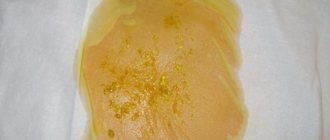General information and classification
Depending on the duration of symptoms, diarrhea can be:
- acute (<14 days);
- persistent (14-30 days);
- chronic (>30 days).
By origin - infectious and non-infectious. Infectious diarrhea, in turn, can be:
- viral (for example, with rotavirus infection);
- bacterial (salmonellosis);
- caused by protozoa (amebic dysentery).
According to the mechanism of occurrence:
- secretory (when more fluid is released into the intestinal lumen than is absorbed, and due to stretching, intestinal motility increases);
- osmolar (when substances appear in the intestinal lumen that “attract” water and irritate the intestinal wall - undigested carbohydrates, bile acids, undigested fats);
- exudative (an inflammatory secretion is released into the intestinal lumen - exudate);
- dyskinetic (intestinal motility is impaired due to altered nervous or hormonal regulation).
Strictly speaking, diarrhea is not a disease, but a symptom that can appear in various diseases, both infectious and not at all related to the gastrointestinal tract. For example, one of the causes of chronic diarrhea may be diabetes mellitus, or more precisely, damage to the intestinal nerves caused by increased levels of glucose in the blood. Therefore, you should not diagnose and treat diarrhea on your own - your doctor will determine the cause faster and more accurately.
Diarrhea can be caused by both intestinal diseases and problems in other organs
Profuse diarrhea
The peculiarity of the disease is that it occurs very quickly, with virtually no incubation period or prerequisites. The clinical picture develops quickly, the person’s general condition rapidly deteriorates. May be accompanied by impurities of pure water and blood, which is caused by reasons such as:
- Invasive diarrhea is associated with the appearance of helminthic infestations, the toxins of which impair the functioning of the intestines. Worms can remain unattended for a long time and live in different parts of the intestine.
- Toxic diarrhea - develops after severe intoxication with harmful chemicals and poisons.
- Medicinal – caused by the development of pathologies caused by long-term use of medications.
Causes of diarrhea
The most common cause of diarrhea is infection. The infectious agent can enter the body through water or food contaminated with feces. This group also includes diarrhea caused by parasitic infestation (giardiasis, enterobiasis, ascariasis).
Of the non-infectious causes of diarrhea, indigestion ranks first. This may be a congenital intolerance to certain foods, among which the most famous are lactose and gluten intolerance. Or indigestion occurs due to a chronic disease of the gastrointestinal tract. For example, pancreatic enzyme deficiency causes undigested fats to irritate the intestinal wall, which in turn causes diarrhea.
Diarrhea can also be caused by chronic non-infectious intestinal pathology, for example, irritable bowel syndrome, ulcerative colitis, Crohn's disease. Finally, it can be caused by diseases unrelated to the gastrointestinal tract. Diabetic enteropathy has already been mentioned above, in which due to high levels of glucose in the blood, the normal innervation (nervous regulation) of the intestines is disrupted. This group includes diarrhea due to hyperthyroidism, hypoparathyroidism, chronic cardiovascular or renal failure, and vasculitis. Diarrhea not associated with gastrointestinal pathologies also includes the “bear disease” known to students.
Diarrhea caused by taking medications should be included in a separate group. Most often, it is caused by uncontrolled use of laxatives in order to lose weight. But digitalis preparations, cytostatics, and immunosuppressants can also provoke excessive intestinal activity.
Loose stools and diarrhea - the main differences
First of all, it is worth remembering that, regardless of the nature of the problem, you need to consult a doctor. After all, only a qualified specialist can establish the correct diagnosis and prescribe treatment. But still, every person in his life is faced with the occurrence of a similar symptom and simply must know the main points that distinguish loose stools from diarrhea. Loose stools are not diarrhea if:
- Defecation does not occur more than 3 times a day.
- The total volume of feces does not exceed 200 ml per day.
Often, in order to get rid of loose stools, it is enough to change your lifestyle and diet, treat chronic diseases or take a course of taking enzymes and bifidobacteria. In addition, loose stools may be an individual characteristic of the body. Diarrhea, in turn, requires immediate treatment, since it indicates intoxication of the body.
In addition, ignoring the problem leads to dehydration, which can be fatal. Therefore, in case of diarrhea, you need to drink a lot, and in severe forms, fill the body with fluid using medication. With loose stools, dehydration does not occur as quickly as with diarrhea. But a person is still obliged to monitor how much liquid he takes.
In order not to encounter the problem of loose stools or diarrhea, you need to be attentive to your diet, taking into account the characteristics of your body, monitor your own hygiene and consult a doctor in a timely manner.
Symptoms of diarrhea
The main symptoms of diarrhea are frequent bowel movements and loose stools. If defecation occurs more than three times a day, but the stool is formed, there is no talk of diarrhea.
Often, defecation is accompanied by urgency (sudden uncontrollable desire to visit the toilet), abdominal pain, and rumbling. With diarrhea caused by infection, the picture is complemented by vomiting, high fever, signs of general intoxication, and sometimes blood or mucus in the stool.
Infection is the most common cause of diarrhea
Diarrhea, which is caused by indigestion, is usually accompanied by signs of maladsorption - impaired absorption of vital substances. The patient loses weight and develops anemia. To summarize, we can say that the symptoms accompanying diarrhea primarily depend on the disease that caused this syndrome.
Symptoms
Clinical manifestations of diarrhea are often characterized by typical complaints. With some types of diarrhea, specific symptoms are noted, which determine the nature of the disease. It is worth noting that sometimes laboratory tests are not able to reliably determine the diagnosis; an anamnesis is required, which includes the manifested symptoms. Therefore, it is very important to monitor any changes in the body during diarrhea.
Symptom 1. Diarrhea and high fever
An increase in temperature is possible in most cases of diarrhea. Basically, high temperature is observed with bacterial and viral nature of diarrhea. When a patient has one of the previously mentioned types of diarrhea, a temperature of 38°C should be considered normal. Worse, when this symptom is absent, it is evidence of immunodeficiency. The increase in temperature depends directly on the types of pathogenic microbes (up to 39°C).
Symptom 2. Diarrhea and vomiting
Nausea is the first natural symptom of diarrhea. Indeed, with this pathological condition, the typical movement of feces and food through the intestines is disrupted, and reflux may occur in the wrong direction.
Against the background of intestinal damage and intoxication, toxic substances are absorbed. Consequently, the first reaction to occur is a gag reflex. Thus, the body cleanses itself of toxins that have entered it.
Symptom 3. Diarrhea and abdominal pain
With enzymatic deficiency, pain will be the primary symptom, followed by diarrhea. The food is not digested, but the process of rotting begins. Gases are consistently formed that leave the body in the form of frequent belchings. And undigested food particles come out along with mucus during diarrhea.
Note! Rotten burps indicate problems with the digestive process, as well as the progression of the disease that caused them.
Pain is characteristic of poisoning and the bacterial nature of diarrhea. Other types of diarrhea are accompanied only by a feeling of heaviness in the stomach.
If diarrhea appears and lasts more than two days, you should urgently seek help from a specialist. Otherwise, complete exhaustion and dehydration may occur.
Diagnosis of diarrhea
Diagnosing diarrhea as a symptom is not difficult - complaints about frequent loose stools are enough. To identify the cause of its occurrence, the doctor collects an anamnesis (contact with patients with infectious diarrhea, an outbreak of intestinal infection in a children's group, hospital, hotel, the presence of concomitant diseases).
During the examination, the doctor pays attention to pain, bloating, and asymmetry.
Microscopic examination of feces allows you to determine the nature of the digestive disorder. The detection of leukocytes in the stool may indicate inflammation, and occult blood may indicate ulcerative colitis, diverticulitis, or Crohn's disease. Testing for worm eggs, stool culture, and enzyme immunoassay help identify the causative agent of diarrhea.
Endoscopic methods - fibrogastroduodenoscopy, irrigoscopy - allow us to assess the condition of the gastrointestinal mucosa. Finally, in some cases (such as neuroendocrine tumors), computed tomography, magnetic resonance imaging, or positron emission tomography can help determine the cause.
Treatment of diarrhea
Treatment for diarrhea will depend on the disease that caused it. For infectious diarrhea, antibacterial and antiparasitic agents are prescribed. It is imperative to compensate for dehydration - this is what causes death during an intestinal infection. In addition, for infectious diarrhea, sorbents are prescribed - these drugs absorb toxins released by the infectious agent and dead intestinal cells. After the end of the acute period, drugs are recommended to restore normal microflora: probiotics (live “useful” microbes), prebiotics (substances that promote the proliferation of normal microflora) and synbiotics (drugs that combine probiotics and prebiotics).
For diarrhea caused by digestive problems, enzyme preparations are recommended; for motility disorders, prokinetics (itomed). In the case of chronic inflammatory bowel diseases, anti-inflammatory drugs are prescribed, sometimes cytostatics and immunosuppressants.
For chronic diarrhea caused by inflammatory diseases, as well as for irritable bowel syndrome, the use of gastroprotectors (rebamipide) is recommended to accelerate the recovery of the intestinal mucosa.
If the disease is caused by pathology of other organs and systems, drugs are prescribed to treat the underlying disease and this therapy is supplemented with drugs to normalize intestinal motility.
Diet is very important in the treatment of diarrhea. The diet directly depends on the cause of the syndrome. Most often, diet No. 4 according to Pevzner is recommended - it is indicated for infectious intestinal diseases. If diarrhea is caused by pathology of the pancreas, Table No. 5a is prescribed, for diseases of the gallbladder - Table No. 5. In cases where diarrhea is caused by intolerance to a particular product, it is often enough to exclude only this product from the diet (lactose-free, gluten-free diet).
What pills to take for diarrhea
All medications for diarrhea are divided into several large groups.
Antibacterial drugs
Such medications are used in cases of diarrhea caused by infectious microorganisms. Before prescribing a drug, for the best effect on the pathogen, you should determine its type - do a culture test for sensitivity to the antibiotic: an incorrectly selected drug can significantly worsen your well-being.
The drugs are available in the form of tablets, injections and suspensions.
Medicine for diarrhea Ersefuril
It is an effective antimicrobial drug. Used for bacterial infections. Indicated for salmonellosis, dysentery, cholera. Effectively acts on staphylococci.
Available in capsules. Take 1 capsule three times a day. The cost is about 350 rubles for a blister of 14 capsules.
Furazolidone for diarrhea
Broad-spectrum antibacterial agent. It acts in the intestines due to the presence of a special protective shell. Indications: diarrhea due to food poisoning or infection.
Anti-diarrhea tablets are taken after meals. The daily dose for an adult is 4-8 tablets. It is relatively cheap. The disadvantages of the drug are many side effects (nausea, increased blood pressure). Contraindicated for children under one year of age.
Levomycetin
Is an antibiotic. Indicated for food poisoning accompanied by fever, nausea, vomiting, and general weakness. Anti-diarrhea tablets are taken 30 minutes before meals, one tablet 4 times a day. The course of treatment is one to two weeks. Contraindicated in children under 2 years of age.
Forecast and prevention of diarrhea
For infectious diarrhea, the prognosis depends on the severity of the disease and the timeliness of medical care: in countries with undeveloped medicine, deaths are not uncommon. But with timely replenishment of the loss of water and electrolytes, as a rule, complete recovery occurs.
To prevent infectious diarrhea, you need to follow the rules of hygiene, wash your hands, fruits and vegetables, and drink only boiled or filtered water. When traveling through the countries of Asia and Africa, it is better to drink only bottled water, wash vegetables and fruits with soap and not buy drinks with ice - it is usually made from unboiled water, which may contain pathogens of intestinal infections.
[1]World Health Organization. Treatment of diarrhea. A textbook for doctors and other categories of senior health workers. 2006











